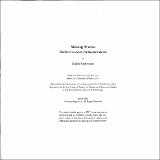Making Waves : the past futures of Azerbaijan's islands
Author(s)
Boghossian, Garine
DownloadFull printable version (37.07Mb)
Alternative title
Past futures of Azerbaijan's islands
Other Contributors
Massachusetts Institute of Technology. Department of Architecture.
Advisor
Rania Ghosn.
Terms of use
Metadata
Show full item recordAbstract
This thesis is a collection of design speculations meant to question the frenzy around capitalist urban development in emerging 'world-class" cities. It particularly studies how post-extraction economies are restructuring the industrial city to promote it as a site of leisure, tourism and real-estate. This transition often uses architecture and urban design that relies on a jargon of superlatives, the signature of starchitects, and the power of mass media image circulation to project a utopic vision. The thesis uses the island as a site for investigation and experimentation. Both a geographical entity and a widely-used metaphor, the island is often defined through dualisms: utopic and dystopic; insular and yet connected. The notion of territoriality is crucial here, where the island with its seemingly defined geographical boundaries is in fact part of a larger geological, socio-economic and political territory. Thus, it often becomes a physical testing ground to realize different social and spatial propositions, such as urban segregation, the development of elite enclaves, exotic tourist attractions, and heightened securitization. Focusing on Azerbaijan's Caspian Seawaters, this thesis studies Baku's offshore urbanization on its natural and artificial islands. Initially significant for their strategic role in protecting the mainland, Azerbaijan's islands have been heavily involved in natural resource extraction and energy production for the past half century. As oil and gas resources deplete and revenues fall, the state is considering alternative ways to diversify its economy. Hence, various post-extraction futures are currently being projected onto these sites: the islands of the Baku archipelago, Pirallahi island as well as Neft Dashlari, the first off-shore drilling facility in the world. The dependence of capital on territory is evident here, whereby investment in Azerbaijan's post fossil-fuel economy is manifested spatially through the proposed redevelopment plans. Two major forces currently shape these islands. First, economic force, which includes both the continued extraction of capital in the form of oil and gas from one field and a transition towards accumulation in the form of real-estate in another. Secondly, ecological force, which encompasses both the manufacturing of artificial landscapes into the Caspian Sea and the destruction of land due to a degraded ecosystem and sea-level rise. In addition to constructing an urban historiography of the islands, this thesis articulates a possible future for each island and presents an urban-spatial, socio-political critique of how the state has been exploiting these forces in the past and will possibly do so in the future. The thesis argues that the most effective medium for engagement in the transformation of Baku is through the circulation of counter-images that challenge the false sense of utopia.
Description
Thesis: S.M. in Architecture Studies, Massachusetts Institute of Technology, Department of Architecture, 2017. Cataloged from PDF version of thesis. "June 2017." Includes bibliographical references (page [4]).
Date issued
2017Department
Massachusetts Institute of Technology. Department of ArchitecturePublisher
Massachusetts Institute of Technology
Keywords
Architecture.